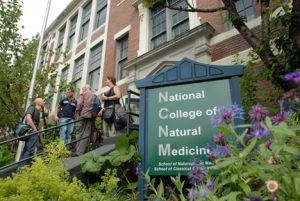 NCNM Bachelor Programs for Health Pre-Professionals Slated to Launch in 2016
NCNM Bachelor Programs for Health Pre-Professionals Slated to Launch in 2016
PORTLAND, Ore. (March 26, 2015)—National College of Natural Medicine (NCNM) will begin offering undergraduate programs—a Bachelor of Science in Integrative Health Sciences and a Bachelor of Science in Nutrition. NCNM received approval to begin both programs in fall 2016 from the Northwest Commission on Colleges and Universities, the regional accreditation agency for post-secondary educational institutions recognized by the U.S. Department of Education. The new undergraduate degrees, offered by the new School of Undergraduate Studies, will join the medical school’s rapidly expanding roster of post-graduate programs, which include the Schools of Naturopathic Medicine, Classical Chinese Medicine, and Research & Graduate Studies.
Both undergrad offerings are two-year, pre-med and pre-health degree completion programs, which focus on integrative medicine or nutrition, respectively.
The increasing interest in natural and integrative medicine, as well as the critical need to strengthen the healthcare workforce in the U.S., has heightened the importance of adequately preparing students for professions in the health and wellness fields. As integrative medicine expands into hospitals and clinics throughout the country, it becomes ever more necessary for NCNM and other educational institutions to provide accessible pathways for future students in graduate and doctoral medical programs. These new undergraduate degrees are designed to help them develop the critical thinking and associated skills required for future graduate medical training.
The programs are designed for students who have previously completed two years of college course work, such as community college students who want to complete their undergrad degree; transfer students from a traditional four-year college or university; or students who have previously withdrawn from a bachelor’s program and want to continue.
The new educational offerings will appeal to students interested in careers in integrative medicine, such as naturopathic medicine, Chinese medicine and acupuncture, chiropractic medicine, herbal medicine, nutrition, holistic nursing and holistic dentistry. These unique undergraduate programs have been developed to meet the demand for access to healthcare or research careers.
In speaking about the programmatic changes at the nearly 60-year-old institution, NCNM President David J. Schleich, PhD, said, “It has long been on our agenda to develop pre-professional programs to better prepare students for the academic demands of medical school and graduate programs.”
Degree Program Overview
Both undergrad programs blend traditional healing knowledge with contemporary science and evidence-based medicine. To accomplish these goals, each program consists of three threads that are integrated throughout the curriculum: a core thread (integrative health sciences or nutrition), a hard sciences thread (such as genetics, immunology or physics), and a social sciences thread (such as ethics, cultural competency or self-reflection).
The Integrative Health Sciences degree features a variety of complementary and integrative medical topics such as herbal medicine, whole-food nutrition and mind-body medicine. The Nutrition degree focuses on topics such as whole-foods nutrition and the connection between diet and disease. Both programs feature a capstone project in which students are required to draw on all aspects of the curriculum to develop a final project, research paper, or complete an internship.
NCNM Strategic Goals
Schleich notes that NCNM’s growth has been rapid as it actively rolls out new programs. “In just a few short years NCNM has grown from a two-program college into the exemplary medical college it is today, with seven diverse doctoral and master’s program offerings within our three distinct schools of medical education. And now we introduce our newest academic enterprise, the School of Undergraduate Studies,” he said.
“Just in the last few years alone, we’ve added master’s degrees in integrative medicine research, nutrition, global health, and most recently, a new program in integrative mental health,” Schleich observed. “Our enrollment has increased 33% since 2007. With the addition of undergraduate programming, NCNM will continue to attract the best and brightest to build on the legacy first established six decades ago by naturopathic doctors who ensured the future of natural medicine by founding NCNM.”